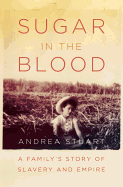
In Sugar in the Blood, an absorbing, evocative history of slavery in Barbados, Andrea Stuart passionately and cogently argues that sugar--"more than any other commodity in human history"--has "shaped our tastes, transformed our landscape and influenced our politics." For Stuart, the story of sugar is complex, painful and profoundly personal: like many others with Caribbean roots, she is descended from a wealthy sugar plantation owner and a female slave.
Stuart's convincing speculations, made credible by impeccable research, begin by following her first identifiable ancestor, George Ashby, on the harrowing voyage to Barbados from England in the 1630s. Once there, he tamed a small patch of wild jungle; his great-great-great grandson, Robert Cooper, married well and became a powerful and moneyed plantation owner. It is from Cooper and one of his slaves that Stuart is descended.
Stuart uses her ancestors to tell the story of Barbados's unfolding from untamed wilderness to cultivated colony to floundering society devastated by violent rebellion and the fatal pitfalls of empire. Her history of the island's slaves is, necessarily, upsetting but vital--from the atrocities of the Middle Passage to appalling labor conditions and the ubiquitous rape and exploitation of female slaves.
Stuart has a historian's respect for truth, an economist's skill for incisive analyses and a novelist's flair for color and detail. Having published two biographies prior to this book, she has expertly applied her skill and sensitivity to this "biography" of Barbados. Her deeply personal connection to the subject--the "sugar in her blood"--makes this history all the more urgent and engrossing. --Hannah Calkins, blogger at Unpunished Vice

